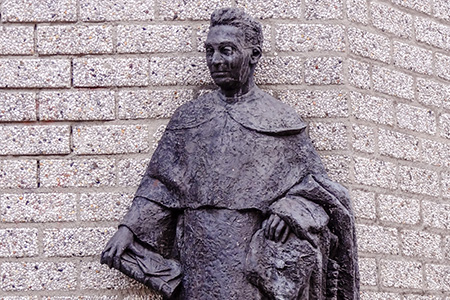 Anno Brandsma was born in the Dutch province of Friesland in 1881. He joined the Carmelite Order in 1898 taking his father’s name, Titus, as his religious name. He made his First Profession in October 1899 and was ordained priest on June 17th 1905. As an academic Titus specialised in philosophy and mysticism.
Anno Brandsma was born in the Dutch province of Friesland in 1881. He joined the Carmelite Order in 1898 taking his father’s name, Titus, as his religious name. He made his First Profession in October 1899 and was ordained priest on June 17th 1905. As an academic Titus specialised in philosophy and mysticism.
He helped to found the Catholic University of Nijmegen in 1923 and later served as Rector Magnificus.
In the years before the Second World War Titus was openly critical of the Nazi ideology. During the occupation of Holland, he defended the freedom of the Press and of the Catholic Press in particular. Titus was arrested in January 1942 and sent to Dachau Concentration Camp where he was killed by lethal injection on July 26th 1942. He was beatified in 1985.
Contemplation
During his life Titus Brandsma stressed the importance of active contemplation.
Contemplation. Some people think that it is a bizarre word, applied to strange people called the mystics.
Some think, “It’s not for me who’s dealing with the real deal of life. It’s only for those praying and living in solitude.”
Yet, Carmelites understand contemplation as an attiude of openness to God, whose presence we discover in all things. As an attiude, it can permeate any dimension of our lives, no matter what our work is.
Contemplation is for everybody!
Inspired by Elijah, “As the Lord lives in whose sight I stand”, Titus stressed the importance of living continually in the presence of God. Needing practice, it involves an awareness of staying before the face of God throughout our day. Even in a life of intense activity, each us can live in God’s presence.
It starts when we entrust ourselves to God, in whatever way God chooses to approach us. It is up to God, not up to us. It is his work in us. God is willing to touch and transform us to be like him. God wants to lead us to be united in love with him, so that we may live in his loving presence. This flow of divine love slowly and gradually changes us. It empties us of our limited and imperfect human ways of thinking, loving, and behaving, transforming them into divine ways.
Beautiful, isn’t it?!
Contemplation, then, is a dynamic element which unites prayer, living in relationship with others and the real deal of life and work.
With contemplation our prayer is no longer a lip service, it becomes contemplative, as St Teresa of Avila says, “A close sharing between friends; it means taking time frequently to be alone with him who we know loves us.” Our relationships with our neighbours becomes contemplative as we are enabled to see God in our sisters and brothers with all their strengths and weaknesses and to appreciate the mystery of those with whom we share our lives. This experience of contemplation in prayer and in community compels us to seek the face of God also in the heart of the world.
This belief moves us then to lend our hands to the ones who suffer and need help. This contemplation is what Titus Brandsma firmly believes in. He summarises Carmelite life as “complete dedication to contemplation; it should be interrupted only because of necessity – when there is need to go to people and speak to them of God. Only charity toward one’s neighbour or obedience can be reasons for leaving God for the sake of God.” God can be found in the places of worship. However, if we have to go and lend our hand to our brothers and sisters in need, we still can find God there. Leaving God for the sake of God is a kind of mantra which helps us to be contemplative anywhere and anytime.
But how far did Titus go with this belief?
The answer is at the very end of his life. Fearlessly Titus fought the injustice the Nazis showed in the Netherlands. He defended the weak who were marginalized and suffered under Nazi oppression, stating bravely, “The Catholic Church does not make any differences regarding sex, race, and people!”
The consequence of this attiude was his detention. When he was in Scheveningen prison, among loneliness and brutal cold, his contemplative eyes saw God. He then wrote a prayer:
For Thou, O Jesus, art with me
I have never been so close to You.
Stay with me, with me, Jesus sweet,
Your presence makes all things good for me.
In Dachau concentration camp, when he was beaten so severely, he sang Adoro Te Devote, a hymn contemplating the presence of Jesus in the Eucharist. What a contrast, as if he wanted to unite his sufferings with Christ’s!
Finally, to the agnostic nurse who would inject him with a lethal solution, cheerfully he gave his simple rosary, encouraging her to pray the last phrase of Hail Mary, “Pray for us sinners.” Titus saw in this agnostic nurse, his executioner, the presence of God. He is truly a contemplative person.
